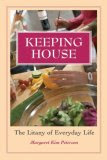
Here are a few of my favorite quotes:
In considering my own cross-stitching (which I realize is more for beauty than utility):
It is this capacity of handwork to make room for joy, room for grief, room for hope and waiting and process, that makes it so valuable a practice in a world that increasingly has no room for any of these things. Many of us have less and less experience with anything that unfolds over time; we expect everything to be instantaneous and are indignant when our e-mail takes more than two seconds to arrive in its recipients' in-boxes. But life is not instantaneous. It takes time, and handwork can be a way to weave temporality and process back into our lives.
On hospitality:
Hospitality, understood in this way, has less to do with dinner parties than it has to do with feeding hungry people who come to your door or who sit down at your table. It has less to do with beautifully appointed guest rooms complete with terrycloth robes and brand-new bars of soap than it has to do with providing tired people with a clean and comfortable place to sleep. It has to do, in other words, with basic provisions for basic needs--the very needs that the disciplines involved in keeping house exist to serve.
She talked about giving and receiving household help in times of trouble:
It is not always easy either to receive or to give such help, particularly if the occasion is something other than a birth or a death or if the help that is needed goes beyond a casserole or two. It requires a certain vulnerability to admit we need help, a certain humility to accept it, and a life already structured to include time for nurturance if we are to be able to offer it. And yet there are depths of relationship that can be explored only if we are willing to admit our needs to one another and to give and receive help when the opportunities arise.
In summary:
This sacramental quality of home means that a well-kept house is a means to an end, not an end in itself. Faithfully keeping house is a way to remember God's promises of home and actively to anticipate the fulfillment of those promises. It participates in these promises by ministering to humans' basic needs for food and clothing and shelter, and it points beyond these temporal and partial satisfactions to the One who is himself preparing a room and a meal and a garment for each of us...we all need homes in which the housekeeping is good enough, in which basic needs are provided for rather than neglected and in which welcome and care are routinely and cheerfully extended to both members and guests of the household.
What a blessing we can be just by doing the dishes!
